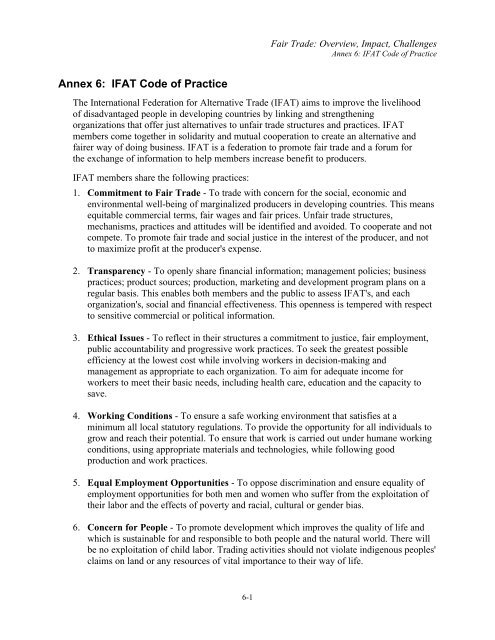Fair Trade: Overview, Impact, Challenges - Are you looking for one ...
Fair Trade: Overview, Impact, Challenges - Are you looking for one ...
Fair Trade: Overview, Impact, Challenges - Are you looking for one ...
You also want an ePaper? Increase the reach of your titles
YUMPU automatically turns print PDFs into web optimized ePapers that Google loves.
Annex 6: IFAT Code of Practice<br />
6-1<br />
<strong>Fair</strong> <strong>Trade</strong>: <strong>Overview</strong>, <strong>Impact</strong>, <strong>Challenges</strong><br />
Annex 6: IFAT Code of Practice<br />
The International Federation <strong>for</strong> Alternative <strong>Trade</strong> (IFAT) aims to improve the livelihood<br />
of disadvantaged people in developing countries by linking and strengthening<br />
organizations that offer just alternatives to unfair trade structures and practices. IFAT<br />
members come together in solidarity and mutual cooperation to create an alternative and<br />
fairer way of doing business. IFAT is a federation to promote fair trade and a <strong>for</strong>um <strong>for</strong><br />
the exchange of in<strong>for</strong>mation to help members increase benefit to producers.<br />
IFAT members share the following practices:<br />
1. Commitment to <strong>Fair</strong> <strong>Trade</strong> - To trade with concern <strong>for</strong> the social, economic and<br />
environmental well-being of marginalized producers in developing countries. This means<br />
equitable commercial terms, fair wages and fair prices. Unfair trade structures,<br />
mechanisms, practices and attitudes will be identified and avoided. To cooperate and not<br />
compete. To promote fair trade and social justice in the interest of the producer, and not<br />
to maximize profit at the producer's expense.<br />
2. Transparency - To openly share financial in<strong>for</strong>mation; management policies; business<br />
practices; product sources; production, marketing and development program plans on a<br />
regular basis. This enables both members and the public to assess IFAT's, and each<br />
organization's, social and financial effectiveness. This openness is tempered with respect<br />
to sensitive commercial or political in<strong>for</strong>mation.<br />
3. Ethical Issues - To reflect in their structures a commitment to justice, fair employment,<br />
public accountability and progressive work practices. To seek the greatest possible<br />
efficiency at the lowest cost while involving workers in decision-making and<br />
management as appropriate to each organization. To aim <strong>for</strong> adequate income <strong>for</strong><br />
workers to meet their basic needs, including health care, education and the capacity to<br />
save.<br />
4. Working Conditions - To ensure a safe working environment that satisfies at a<br />
minimum all local statutory regulations. To provide the opportunity <strong>for</strong> all individuals to<br />
grow and reach their potential. To ensure that work is carried out under humane working<br />
conditions, using appropriate materials and technologies, while following good<br />
production and work practices.<br />
5. Equal Employment Opportunities - To oppose discrimination and ensure equality of<br />
employment opportunities <strong>for</strong> both men and women who suffer from the exploitation of<br />
their labor and the effects of poverty and racial, cultural or gender bias.<br />
6. Concern <strong>for</strong> People - To promote development which improves the quality of life and<br />
which is sustainable <strong>for</strong> and responsible to both people and the natural world. There will<br />
be no exploitation of child labor. Trading activities should not violate indigenous peoples'<br />
claims on land or any resources of vital importance to their way of life.
















![CynefinFramework final [Read-Only]](https://img.yumpu.com/19017304/1/190x135/cynefinframework-final-read-only.jpg?quality=85)